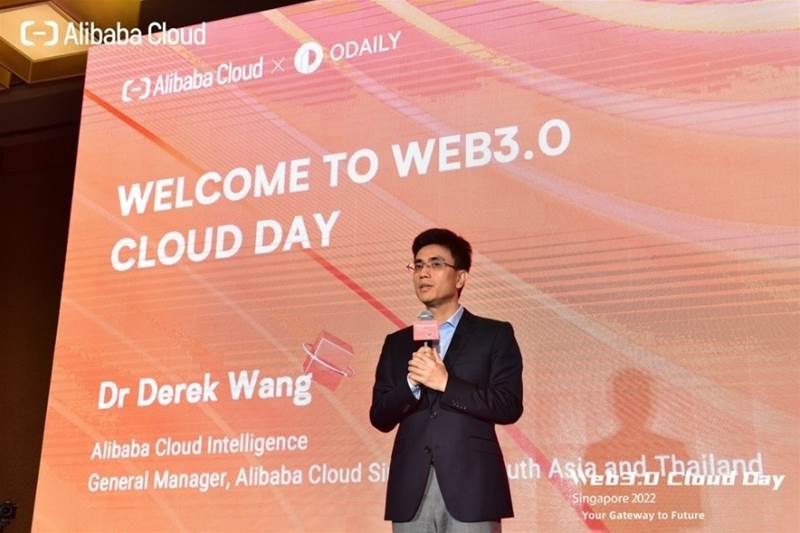Built to support the growth of the evolving Web 3.0 ecosystem, Alibaba Cloud, the digital technology and intelligence backbone of the Alibaba Group will launch its first Blockchain Node Service in the first quarter of 2023.
Around 100 initial users would be recruited for the beta testing. Along with that, a series of Web 3.0 Hackathons are planned in Singapore, Japan, Thailand, and Hong Kong early next year.
The blockchain PaaS (platform as a service) is built to help developers reduce operational and maintenance time when building and deploying products.
This will support the growth of the Web 3.0 ecosystem and better serve developers with Alibaba Cloud’s infrastructure.
The node-hosting service has the capability to actively monitor the nodes and, in case of an outage, automatically switch between nodes, by leveraging Alibaba Cloud’s scalable, high-performance and strong infrastructure.
This ensures that the blockchain service does not require any hands-on monitoring and mitigation. As a result, developers can concentrate on product development and speed up the product roll-out process.
With Alibaba Cloud’s world-class security and global compliance capabilities, the blockchain node service is backed with a security infrastructure that can detect intrusion and defend against attacks on the nodes.
In preparation for the launch of the Blockchain Node Service early next year, Alibaba Cloud has started to work with partners to offer scalable, highly efficient and secure infrastructure to help build the Web 3.0 ecosystem and work with a global community of developers.
Alibaba Cloud has recently expanded its line of infrastructure technology and intelligence tools to the Avalanche public blockchain, which is a proof-of-stake blockchain.
This enables users to launch validator nodes through the service and access computing, storage, and distribution resources through Alibaba Cloud’s suite of products in Asia.
Platform for Web 3.0 developers
Alibaba Cloud has also created an infrastructure and technology platform for Web 3.0 developers in partnership with HashKey Group, a Hong Kong-based end-to-end digital asset financial services group and Web3.0 infrastructure provider.
It is also working with PlatON, a next-generation internet infrastructure protocol based on the fundamental properties of blockchain and supported by the privacy-preserving computation network.
Alibaba Cloud Intelligence’s Head of International Industry Solutions and Architect, Raymond Xiao, said the popularity of the node has grown significantly in Asia, driven by the increasing demand from enterprises for tools to simplify complex inter-silo dependencies.
“On top of flexibility and efficiency, Alibaba Cloud’s stable and reliable enterprise-class node service backed with comprehensive security features offers developers an extra layer of confidence when they navigate across different frameworks seamlessly,” Xiao said.
Alibaba Cloud Singapore, South Asia and Thailand, General Manager, Derek Wang, said Web 3.0 is currently at its early development stage and it is the “next generation of the Internet”.
This is why it is being embraced by users, especially in Southeast Asia, he added.
“Alibaba Cloud’s strong infrastructure across APAC and global leading security and compliance capabilities put us in a strong position to support the growth of the Web 3.0 ecosystem. We are committed to better serving customers for exploring new business opportunities, and consumers for a more user-friendly and immersive experience,” Wang said.
High-performance platform
As a global leading IaaS (Infrastructure as a Service) and PaaS provider, Alibaba Cloud aims to provide robust, secure and high-performance technology platforms and intelligence tools for worldwide Web 3.0 developers to build their own applications, for example in the metaverse, or into gaming and social media.
Alibaba Cloud launched the "Cloud ME" hologram powered by its real-time communication (RTC) solution during the Olympic Winter Games in Beijing in 2022.
The technology facilitated social interactions for people keen to explore bona fide meeting experiences during the Olympic Winter Games, enabling them to meet and enjoy real-time conversations via life-sized, true-to-life projection.
Alibaba Cloud and Japan’s leading development studio JP Games have also jointly launched a series of new services developed to create realistic virtual spaces and avatars for global customers who venture into space.
The service includes the automatic creation of visually stunning 3D virtual spaces, high-quality graphics from 2D landscape photos, as well as the automatic creation of user avatars simply by taking selfie photos.





